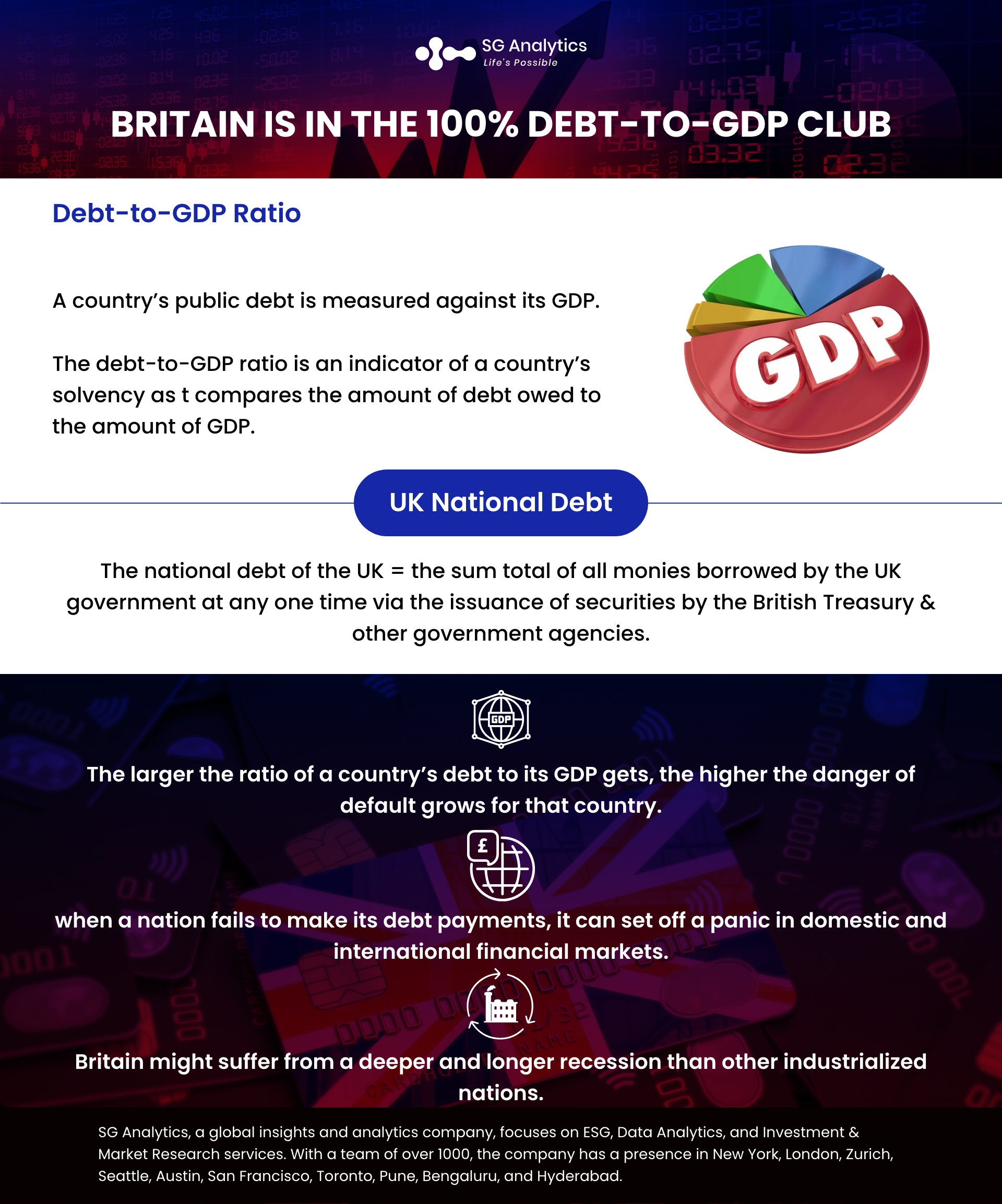Because of Covid, several governments now owe more than they bring in each year, but the United Kingdom has less clout among lenders than many others. The United Kingdom is very close to joining the club of countries with a debt-to-GDP ratio of 100% (Guardian), a club it has successfully avoided joining for the past six decades.
Even while the debt-to-income ratio surged in the early months of the pandemic, from 83% to 94%, and then to over 104% (Guardian) in 2021, it is currently on track to remain in triple digits for the rest of the decade. This is the size and scope of the rescue packages that are needed to keep millions of households from being impacted by the energy crisis and hundreds of businesses from going under.

This is not the way many families think about their outstanding financial obligations. If the outstanding balance on their mortgage was compared to their annual income, the majority of people who had mortgages would have a debt-to-income ratio. However, the ratio of a country's debt to its GDP has become the standard by which international investors evaluate a nation's ability to meet its financial obligations. As a result, international financial institutions keep a close eye on the size of the budget deficits of national governments since, if these deficits are larger than the rate of economic growth, the total amount of debt will increase.

According to experts, a temporary reduction in the ratio of the United Kingdom's debt to its gross domestic product (GDP) below 100% (Guardian) in the coming year will prove to be temporary: It will appear natural for the United Kingdom to have a ratio that is more than 100% in around four or five years.
Since Russia began its invasion of Ukraine, the value of the pound has dropped from $1.36 to $1.16 (Guardian) and is moving closer and closer to being equal to the dollar. A weaker pound will lead to higher inflation because the United Kingdom is so dependent on uncooked materials and parts that are imported. The United Kingdom is currently experiencing unprecedented levels of difficulty as a result of high inflation, rising debt, a prolonged economic downturn, and a catastrophic power outage.

What Is the Debt-to-GDP Ratio?
A country's public debt can be measured against its GDP using the debt-to-GDP ratio (GDP). The debt-to-GDP ratio is a trusted indicator of a country's solvency since it compares the amount of debt owed to the amount of GDP. This ratio is frequently expressed as a percentage but may also be understood as the number of years required to repay debt, assuming 100% of GDP went towards that purpose.
A stable nation is one that can keep paying its debt interest without having to seek new finance or slow its economic growth. External debts, sometimes known as "public debts," are amounts due to lenders outside of the country. Countries with high debt-to-GDP ratios often struggle to repay these obligations. Creditors typically demand higher interest rates in these situations.

UK National Debt
The national debt of the United Kingdom is the sum total of all monies borrowed by the government of the United Kingdom at any one time via the issuance of securities by the British Treasury and other government agencies. As of the end of 2021, the UK government's total debt was £2,382.8 billion, or 102.8% of GDP. As a result of the Bank of England's quantitative easing initiative, the British government now owns around a third of the national debt. Hence roughly a third of the cost of paying the debt is paid by the government itself.
Inflation is extremely high in the UK, and economic growth is very slow. Recovery from Covid lockdowns and rising oil prices have led to the worst cost-push inflation since the 1970s, both of which can be attributable to global short-term concerns. While there are immediate concerns, longer-term problems include the expenses associated with Brexit, slow productivity growth, and a deterioration in competitiveness with our key trading partners. Reduced productivity can be traced back to a number of factors, including businesses' and governments' tendency to focus only on the near future. Certainly, Covid interruptions have increased this reluctance to invest in new technology, but this issue predates Covid and even the Brexit vote.

UK Economy (According to Wikipedia)
The British economy is a well-developed example of a social market and market economy. It has the world's sixth-largest economy by nominal GDP, the eighth-largest by PPP, and the twenty-fifth-highest by GDP per capita, accounting for 3.3% of the world's nominal GDP.
By 2020, the United Kingdom has risen to the position of the world's fifth-largest exporter and fifth-largest importer. It also received the third-most FDI from abroad and sent out the fifth-most FDI. In 2020, the European Union member states accounted for 49 percent of British exports and 52 percent of British imports.
London is the second-largest financial hub in the world, and the service sector accounts for 81% of GDP. When compared to other European cities, London's economy and GDP per resident are unmatched.
Also Read - UK Energy bills are soaring: All you need to know!

Conclusion
When a nation fails to make its debt payments, it can frequently set off a panic in the financial markets both domestically and internationally. As a general rule, the larger the ratio of a country's debt to its GDP gets, the higher the danger of default grows for that country.
Due to recent political unrest, disruptions in trade, an energy crisis, and rising prices, the United Kingdom is now categorized as an "emerging market country." In addition, the country is experiencing challenges in the trade as a result of Brexit and the delays associated with Covid.
The plans that the government has to increase the economy by reducing income and company tax are flawed, and the fact that the government has been inactive for months implies that Britain might suffer from a deeper and longer recession than many other industrialized nations. The Bank of England has warned that the United Kingdom's economy would enter its longest recession since the global financial crisis of 2008 in the coming quarter.
With a presence in New York, San Francisco, Austin, Seattle, Toronto, London, Zurich, Pune, Bengaluru, and Hyderabad, SG Analytics, a pioneer in Research and Analytics, offers tailor-made services to enterprises worldwide.
A leader in Market Research services, SG Analytics enables organizations to achieve actionable insights into products, technology, customers, competition, and the marketplace to make insight-driven decisions. Contact us today if you are an enterprise looking to make critical data-driven decisions to prompt accelerated growth and breakthrough performance.









